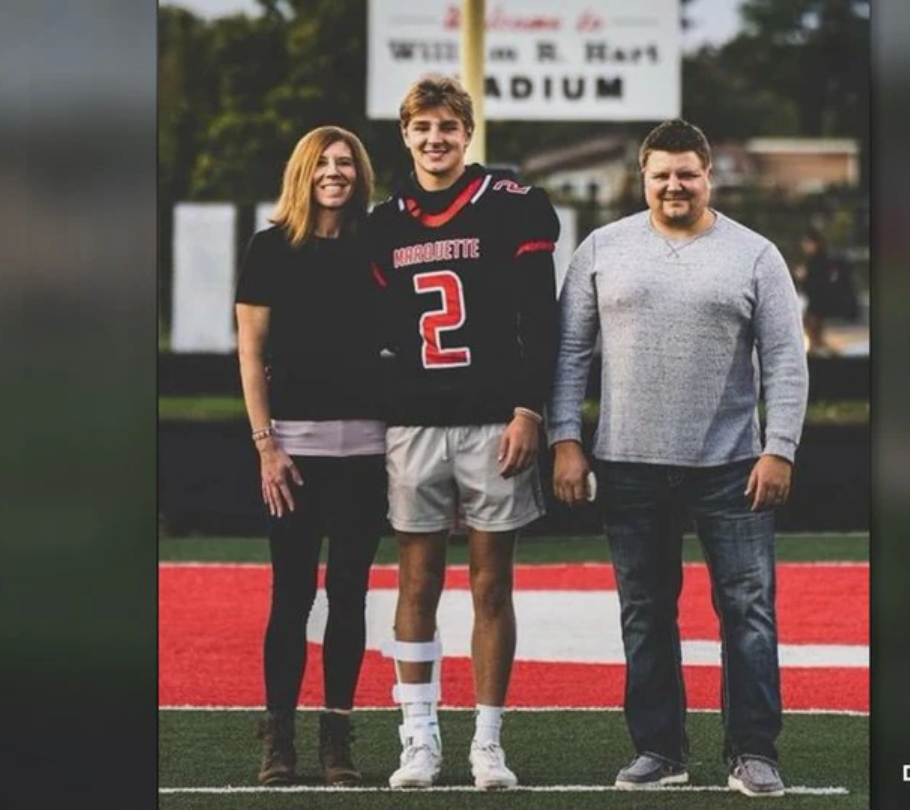Father of teen sextortion victim issues blunt warning: ‘We had zero chance to stop it’
John DeMay has urged parents to educate themselves on the dangers of sextortion plots after the death of his 17-year-old son Jordan.
The father of a star high school athlete who died by suicide after allegedly being blackmailed by an international “sextortion” ring has issued a blunt warning to parents.
Jordan DeMay, a student at Michigan’s Marquette Senior High School, was found dead from a self-inflicted gunshot wound on 25 March 2022 after exchanging messages with a Nigerian man posing as a woman on Instagram, according to a Department of Justice indictment issued last month.
The alleged scammer convinced Jordan to send a nude photo and threatened to send it to all of his friends and family if he didn’t pay $1,000, before taunting him when he shared suicidal urges, authorities said.
John DeMay told Fox News this week that Jordan’s death had completely blindsided his family, and urged every family to educate themselves on the dangers of sextortion plots.
He added that parents should reinforce to their teenagers that the threats are not worth dying over.
“(Kids) have to just understand that this isn't the end of whatever they think is their life, because it's not,” Mr DeMay said.
Mr DeMay said he had monitored Jordan’s phone usage closely when he was younger, and restricted his access to social media. But as he approached adulthood, he eased up as most parents do.
He said Jordan had been a homecoming king, a role model and a promising football and basketball player at Marquette High.
“My son was smart. He was a good student. He was a great athlete. Someone came to his bedroom at three in the morning and murdered him through Instagram when we were all sleeping at night, and we had zero chance to stop it,” he told Fox News.

Last month, Mark Totten, the US attorney for the Western District of Michigan, announced three Nigerian men Samuel Ogoshi, 22, Samson Ogoshi, 20, and Ezekiel Ejehem Robert, 19, had been indicted on charges including sexual exploitation of a minor, conspiracy to distribute child pornography and internet stalking in connection with Jordan’s death.
Prosecutors allege the three men gained access to an Instagram account by the name of “dani.robertts”, and impersonating the user encouraged more than 100 victims to send nude photographs.
On the night he died, prosecutors say Jordan sent a naked shot of himself to Samuel Ogoshi.
“I have screenshot all ur followers and tags can send this nudes to everyone and also send your nudes to your Family and friends Until it goes viral… All you’ve to do is to cooperate with me and I won’t expose you,” Mr Ogoshi allegedly wrote.

He ordered the Michigan teenager to pay $1,000 and promised not to “expose” him. After Jordan handed over $300, the Nigerian allegedly issued further threats.
When Jordan said he was going to kill himself, Mr Ogoshi wrote back: “Good. Do that fast. Or I’ll make you do it. I swear to God.”
The number of reported sextortion cases has exploded in recent years.
In December, the FBI issued a national public safety alert to warn parents after seeing a tenfold increase in online sexual blackmail cases.
According to the FBI, at least 3,000 children were victims of sextortion plots that were connected to more than a dozen suicides in 2022.
Most of the victims were teenage boys, with kids as young as 10 being targeted.
“Victims may feel like there is no way out — it is up to all of us to reassure them that they are not in trouble, there is hope, and they are not alone,” said FBI Director Christopher Wray in a statement at the time.
In May, South Carolina lawmaker Brandon Guffey introduced “Gavin’s Law” to the state legislature after the death of his son in a sextortion plot last year.
Under the law, scammers who extort a minor face up to five years in prison for a first offence.
If you are experiencing feelings of distress and isolation, or are struggling to cope, call National Suicide Prevention Helpline on 1-800-273-TALK (8255). The Helpline is a free, confidential crisis hotline that is available to everyone 24 hours a day, seven days a week. If you are in another country, you can go to www.befrienders.org to find a helpline near you.
If you are based in the UK, the Samaritans offers support; you can speak to someone for free over the phone, in confidence, on 116 123 (UK and ROI), email jo@samaritans.org, or visit the Samaritans website to find details of your nearest branch.



Bookmark popover
Removed from bookmarks